Global Lens Reflections on life, the universe, and everything
Ugandan women fight back against poverty
Confronting climate change and poverty with new agricultural and financial skills
By Paul Jeffrey
Published in response magazine in September 2015.
In two small villages in Uganda where hunger and disease have torn apart families and ravaged the environment, rural women are making change with help from their sisters in United Methodist Women.
In Kabulasoke, a women’s group has used funds from the Call to Prayer and Self-Denial offering to buy seeds and agricultural tools, learn better composting techniques, and grow new varieties of vegetables that offer better nutrition for their families–and improved status for women who’ve long suffered from abuse and domestic violence.
“Everyone should have enough food to eat, but we never did, and what little money we had was spent on food, leaving nothing for school fees and other needs,” said Grace Buba, a mother of nine children in Kabulasoke. “My children would get sent home from school because I couldn’t pay the fees. But then we learned to grow more and better vegetables, and not only do we now have enough to eat, but I can sell my surplus and earn money. Now I can pay the school fees, and people stop me to ask why my children look so healthy.”
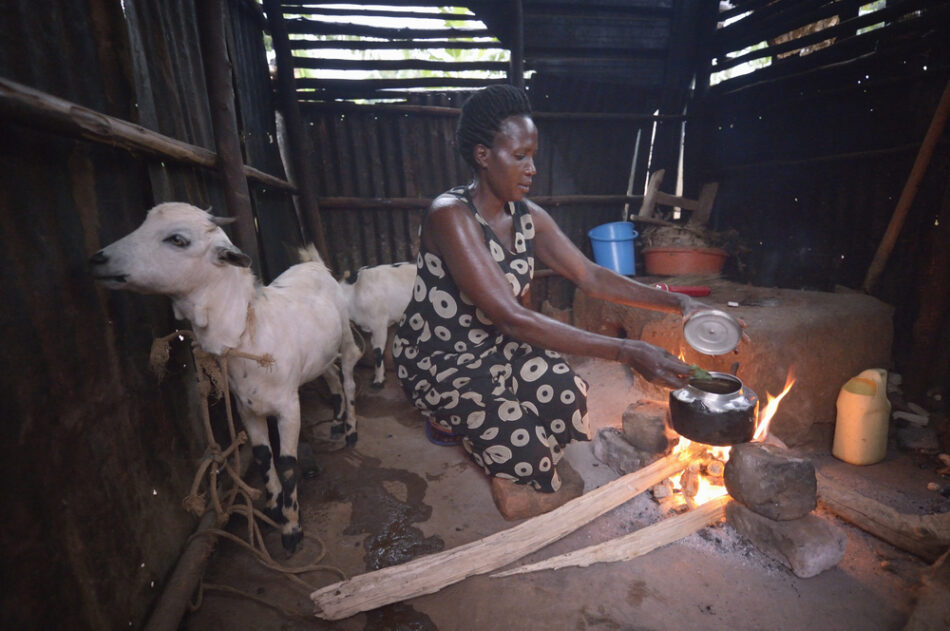
Not everything has changed, however.
“My husband doesn’t like the vegetables. But he likes that we have more money now,” Ms. Buba said.
Like countless villages across East Africa, Kabulasoke has struggled with relentless environmental deterioration. Poor farmers have worked the thin topsoil to death, then been encouraged to pour on expensive chemical fertilizers in an effort to coax more production from the tired soil. Trees have steadily disappeared as machete-wielding women have sought out fuel for their wood-fired kitchen stoves. Regional climate change has brought changing rainfall patterns and drought.
And the burden of all this change has been born by women.
“It’s the woman who has to walk longer distances to get firewood and spend longer waiting in line to pump water at the community well,” said Cissy Nyarwa, the program coordinator of the Ntulume Village Women Development Association (NVIWODA).
“Climate change is not gender neutral.”
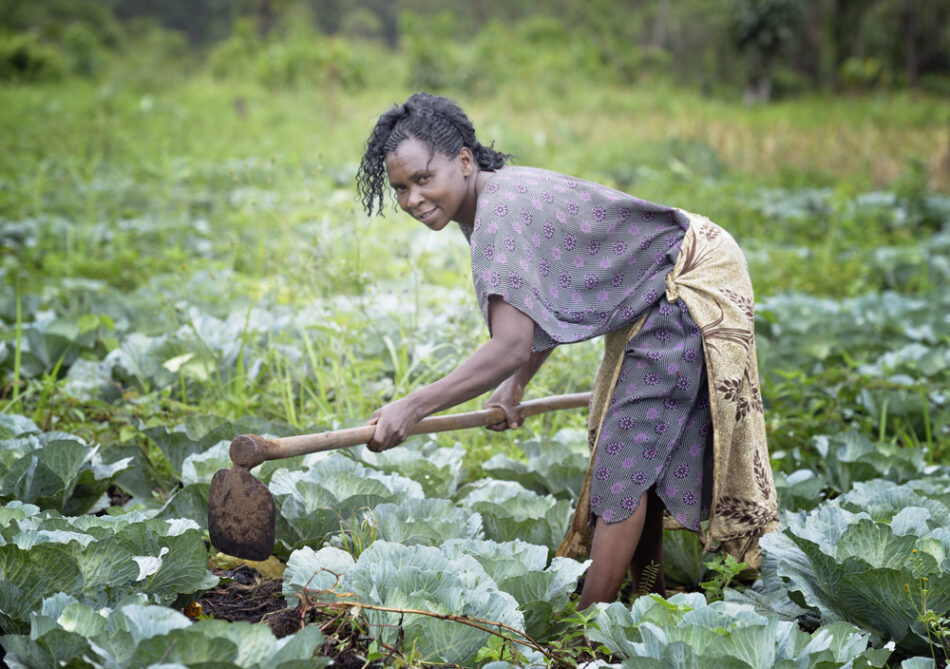
Kabulasoke is a village of rural farmers, yet over time the viability of farming was endangered by the way people practiced it.
“People have been farming the same land over and over, using the same traditional methods. The soil has become less fertile and people were getting smaller yields. The farmers started using chemical fertilizers without any knowledge. This was dangerous to their health, and dangerous to the soil, because when they spray they are killing the microorganisms that make the soil,” Ms. Nyarwa said. “This created a big challenge to the women, who had begun to give up on growing food.”
A NVIWODA survey of the community showed families were buying more and more of their food supply from local shops. “But they didn’t earn an income to buy this food, so that meant they were eating just one meal a day, waiting all day to eat at 5 o’clock,” she said.
“The husbands were not happy”
Although there’s not much the women can do about changing weather patterns, NVIWODA did help them learn to renew the soil using compost they made with cow dung. They planted new varieties of vegetables, many of them drought-resistant. Since the women have to carry water from a well, often at quite a distance, to water their crops during the dry season, they dug trenches to funnel water into underground reservoirs they built.
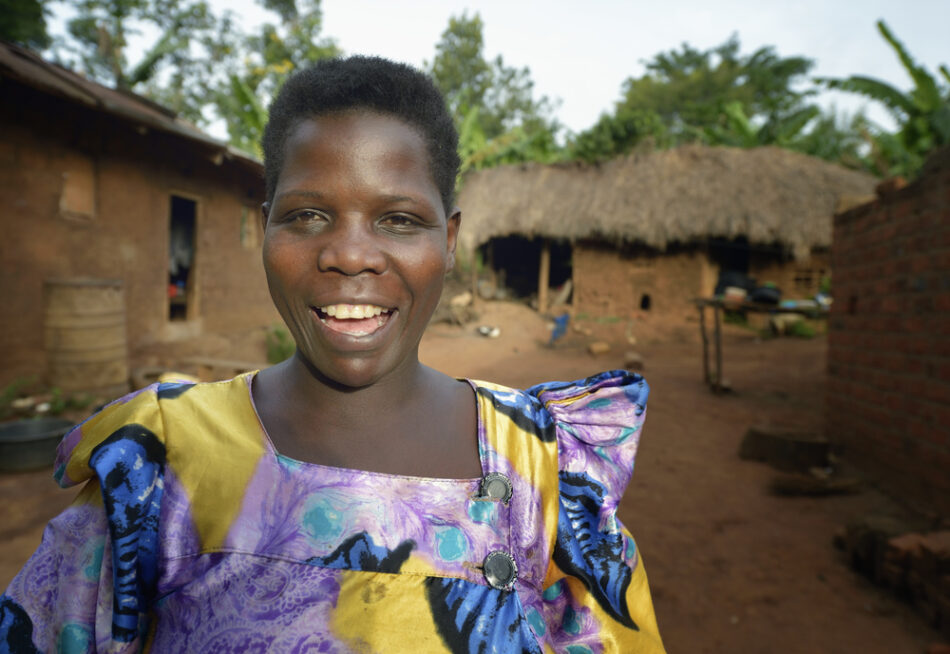
The program has its limits. One is land. Many of the women have long been squatters, farming land that belongs to others. As long as the owners weren’t around, there was no problem. But now some absentee owners who’ve made money in Kampala are coming back and reclaiming their property, at times to plant large fields of commercial crops. “Owners are coming back to the community and claiming the land. They put up fences and kick the squatters off,” Ms. Nyarwa said. This also reduces the area where women can forage for firewood, meaning they have to walk farther and spend more time gathering the wood they need to cook.
Another issue has been the men. Many of the women have had to cope with husbands who denied them use of family land to plant new crops. Some even opposed NVIWODA’s invitation to the women to spend a week at a nearby agricultural training center. Such resistance has diminished over time, however.
“When we took the women for a week to our training center, the husbands were not happy about that,” Ms. Nyarwa said. “But when the women came back and started implementing what they had learned, the husbands started supporting them.”
Annett Nakamya said her husband wasn’t initially supportive, and had never helped her in the garden. It simply wasn’t work suitable for a man. Then one day he found her carrying composted manure to spread among her banana trees. “He grabbed the wheel barrow and started carrying it himself,” she said. “I knew at that moment that things had changed.”
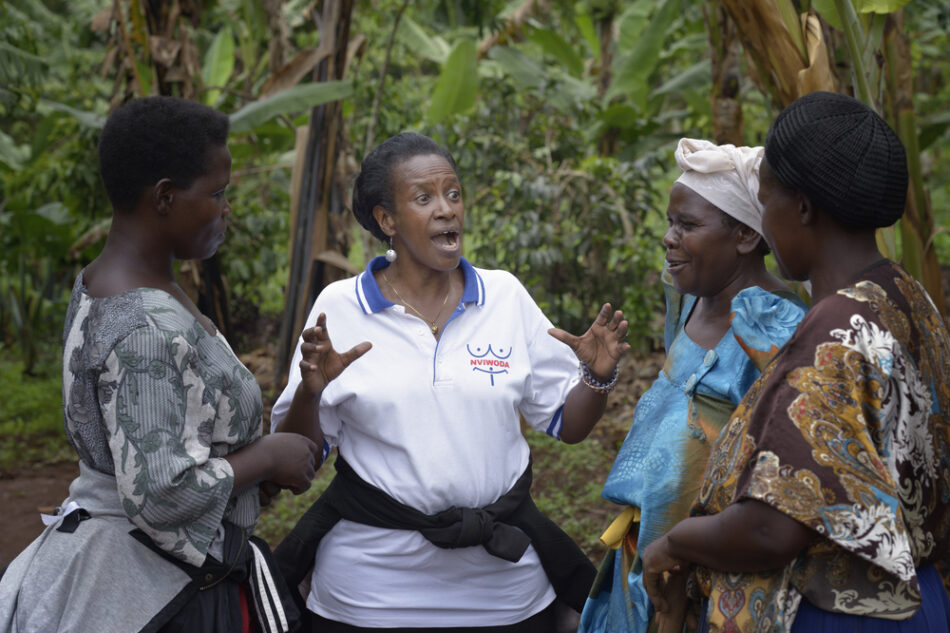
As part of the training, the women participants discussed domestic violence and met with local police officials to understand better their rights–and to help build awareness in the police force. Yet Ms. Nyarwa says simply helping households to push hunger away helps reduce domestic violence in the community.
“Before, the women were always asking for everything. Now when the men see the women are growing vegetables, the husbands feel better, they’re a bit relieved from the burden of having to provide everything. When women become economically empowered, men treat them better,” she said.
The larger community has certainly had to rethink its opinion of the women who participated in the program. “When they saw the women going away for a week, many people said, ‘They’re going away to waste their time.’ But now that they see the results, they want the same training,” Ms. Nyarwa said. “And we would love to train more. But the others aren’t waiting; they’re coming to learn from the original group of women, who say their homes have become tourist sites. Others women come and ask, ‘What is that you’ve planted? How did you do that?’ They share the knowledge and the entire community benefits.”
Annet Mwenyango wasn’t part of the group of women who received training, but she’s been mentored by her neighbor–Prossy Nalazibwe–who did. “I learned how to plant beans and grow vegetables and cook a variety of foods, and I put in a fish pond,” said Ms. Mwenyango. “I’ve got an income and my kids are stronger than before.”
The women have also gone to the community’s schools to educate children about proper nutrition, part of remaking the food culture into something more healthy and sustainable.
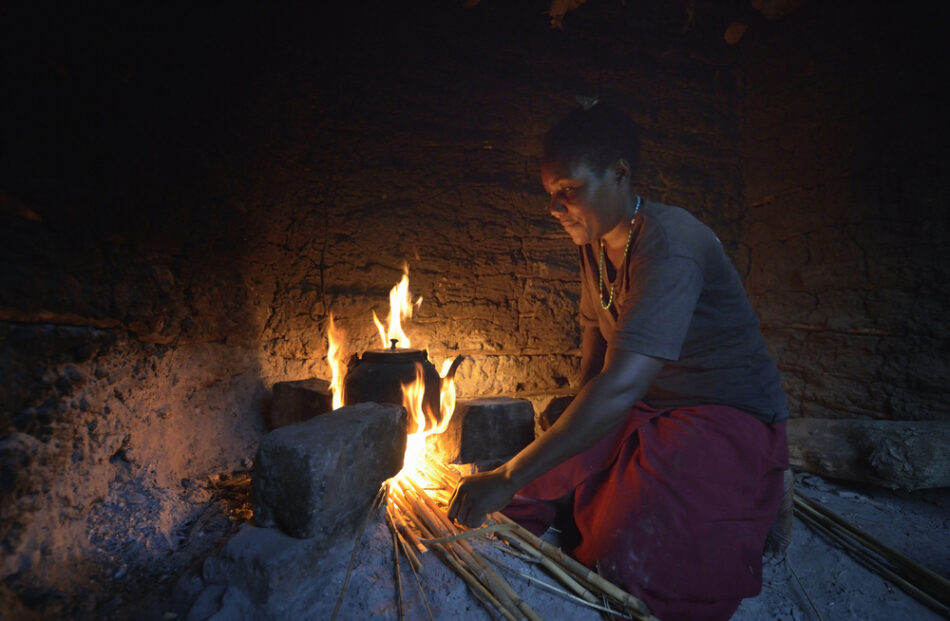
The Ugandan government has tried to carry out programs increasing food security in the countryside, Ms. Nyarwa says, but women seldom benefit.
“The central government formulates good policies, in English, but it’s the local authorities who implement them. Rural women who are poor and uneducated can’t participate in the fora where these things are talked about. They meet in the evening to discuss these issues. That’s when the women are in their houses, with their children. So you can have good policies, but if women don’t know about them, how are the women going to be included?” she said.
“Women often lack the confidence they need. Even if there are good policies, how will they express themselves to the officials in the offices? Though the policies are good, the women remain behind, unable to access the programs.”
“I make sure the numbers add up”
While the Kabulasoke program has wrought change by taking aim at combating food insecurity, another program in Uganda–also funded by the Call to Prayer and Self-Denial–has focused on fighting financial illiteracy.
The town of Lukaya sits along a major highway, and for decades truck drivers have spent the night there. When HIV infections began to spread throughout Africa in the 1980s, Lukaya was a focal point of the disease. Poor women drawn to prostitution–and local men who patronized the highway brothels–carried the virus back to their homes in Lukaya and nearby villages. Soon orphans began to outnumber adults in some areas.
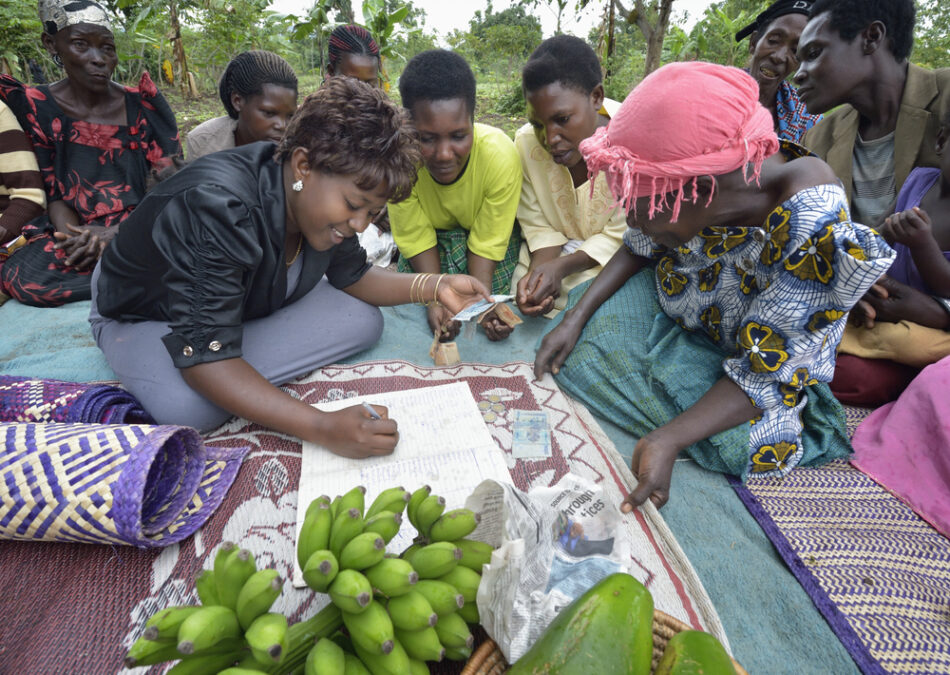
Many of the families in Lukaya are headed by widows. Sylvia Namaganda is one of them. Her husband died three years ago, leaving the 35-year old woman with three children. When Ms. Namaganda’s sister died, she took in her four children. So today Ms. Namaganda cares for seven children, and her only source of income is what she can grow on a small plot of land. With help from the Good Samaritan Women’s Project, Ms. Namaganda started keeping track of her finances, and she joined a self-help savings group. She’s doing better, and recently acquired a pig and chickens which she intends to raise and sell.
“It all goes to school fees for the children, and I’m still struggling to pay for them all, but I’m doing better than before,” she said.
Another woman who participated in the program, Matilda Kasirida Lwasa, is in her 80s. She doesn’t know exactly how old she is, but she farms her small plot. “I’ve learned to place the right value on the crops I sell, and to make sure they pay me the right amount,” she said. “Sometimes people want to pay me in instalments, but I won’t do that. When I need to buy salt or sugar, I can’t pay in instalments, so why should they pay me that way?”
Ms. Kasirida Lwasa admits she doesn’t write as well as she used to, but says she calls a neighbor girl to do the writing for her. “But I can read it and I make sure the numbers add up,” she said.
The program grew out of a survey that GSWP did in 2013. The organization polled 200 women and 200 youth in the community. They found that while almost all of them were poor, their financial illiteracy pushed them farther toward the margins.
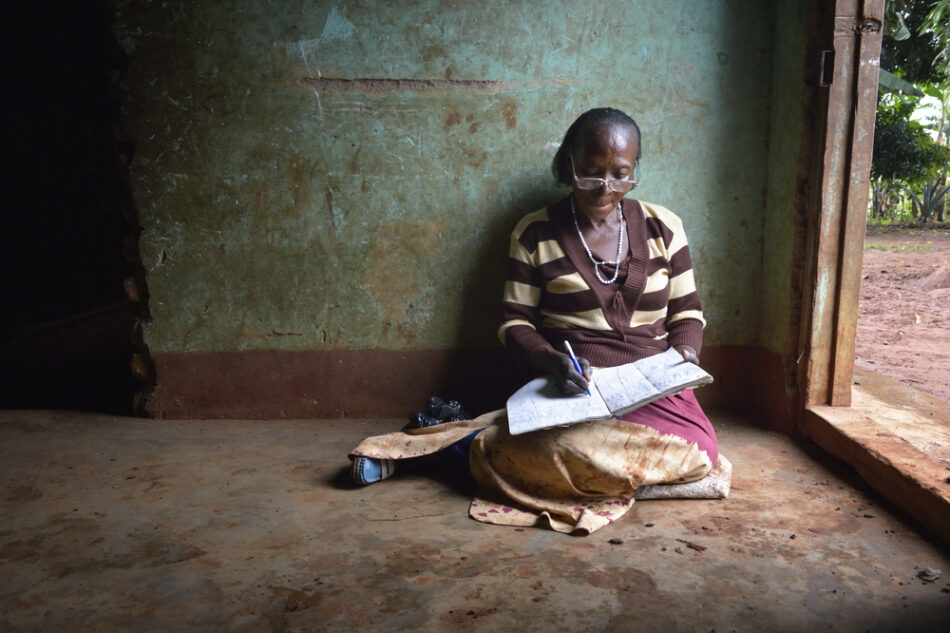
Neither group of those surveyed kept financial records. Nor did they discuss financial matters in the family because the culture expects men to provide for the family’s needs. More than 80 percent of the women were widows, and reported they had no one with whom they could discuss their finances. None of the surveyed women had access even to small loans, because they had no collateral.
The youth, especially those who had dropped out of school, showed no exposure to the principles of good money management, like the importance of saving and how to avoid financial predators. Youth who were still in school said that while many did petty jobs on weekends, such as digging and selling roast cassava in the market in order to earn their school fees, they didn’t prepare a budget on paper nor did they discuss finances with their family.
Although many of those surveyed earned very little from either farming or basic trading in the market, they were all interested in learning how to manage it better. As one woman told surveyors, “When you have so little, you have to become expert in managing it. If not, it will disappear from your hands before you even have a chance to count it.”
GSWP started a campaign to build financial literacy in Lukaya. With finding from the Call to Prayer and Self-Denial, it hosted workshops, provided mentors, and launched a series of programs on a local radio station. GSWP worked with school teachers to educate young children about financial matters, and prodded religious leaders to talk about financial responsibility during their gatherings. Funding from United Methodist Women bought bicycles for volunteer promoters to move around in neighboring villages. Over 2,000 beneficiaries developed goals, prepared budgets, and carried out an accounting system to track their personal finances. Many women involved in the program joined self-help savings groups.
The burdens of widows
According to Rosemary Nakijoba, the executive director of GSWP, the widows of Lukaya still face a number of challenges.
“Some of them are very old, but they have a lot of work to do. They have to work in their gardens, but before that they have to prepare the children to go to school, to make sure the children study, to assure that the children have their school fees. One woman may care for seven or eight children, all orphans. Feeding them is not easy, because you have to have enough food from your farming to feed them, and they have to have food to take to school. They have to have money for their school fees, and for scholastic materials. They also need health care; if they are sick they have to go to the hospital. Just imagine one widow taking care of all these children, meeting all their needs. It is not easy,” she said.
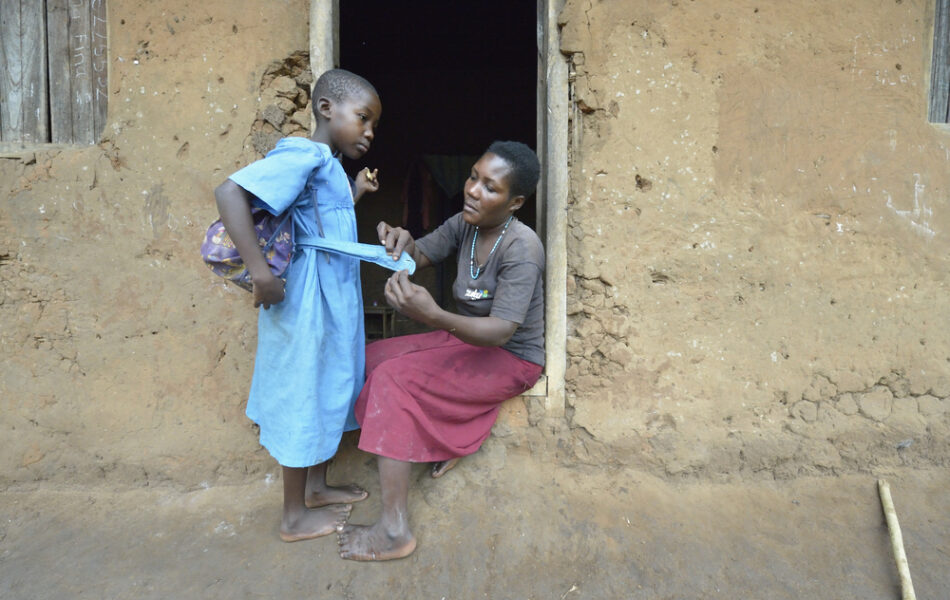
Ms. Nakijoba says that women with husbands also benefitted from the training.
“In those families the women have worked well with their husbands and children. There is happiness in the home because the woman has money to contribute toward the family’s basic needs,” she said.
“We are happier in the family when I have money to contribute toward our expenses. My husband respects me more when I can do this, and we can plan together,” said Madrine Nakafeero.
Some of the participants warned that although the woman’s status is improved because she earns money, problems can still arise.
“Men are very wise. When you get your money, he finds a way to trick you. You can go to the local council to complain, but they won’t do anything. So you give up,” said Jane Nampijja.
“It’s terrible that we have to count our money carefully and hide it from the men, but otherwise they’ll spend it on drinking and other women,” said Maria Nannyonjo.
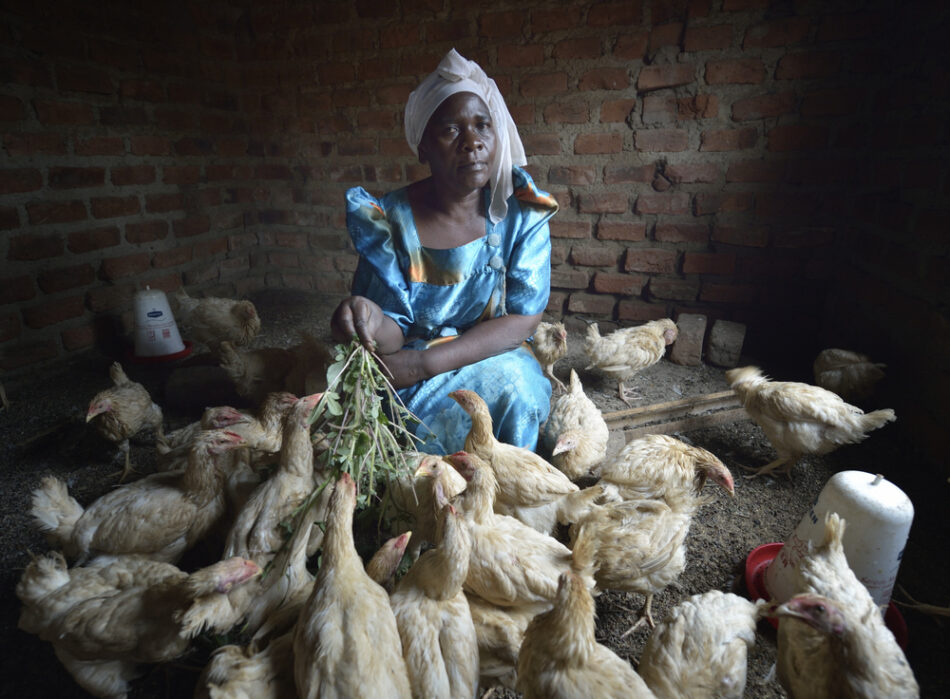
Each week the Lukaya women gather in their self-help groups, each putting in their weekly savings while sharing news of the community. These are joyful gatherings. “The women share the progress they’ve made, even little steps like being able to buy some soap or sugar for their families because of the money they’ve earned from selling their excess crops. They’ve developed a vision of where they want to go, and all the budgeting and financial management skills provide them the little steps that will get them there,” said Ms. Nakijoba.
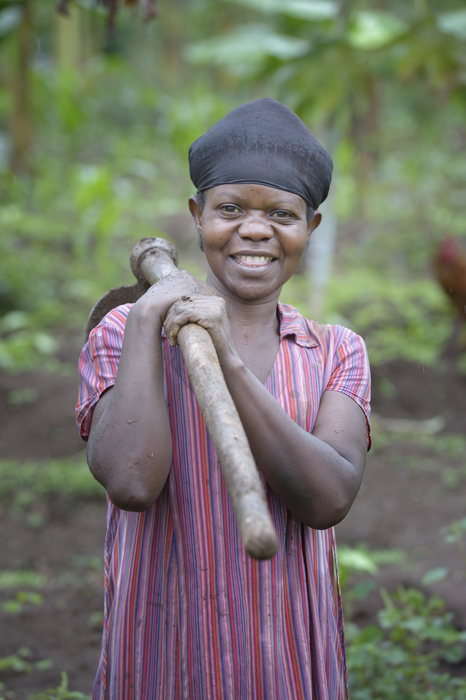
The Rev. Paul Jeffrey is senior correspondent for response and lives in Oregon.